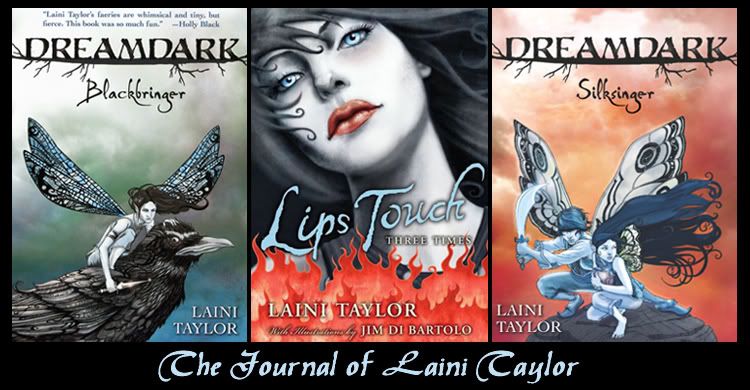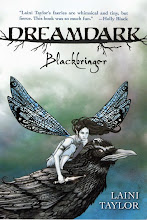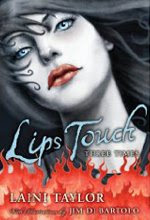That was my favorite line in Joann Sfar's brilliant graphic novel The Rabbi's Cat, and it sums up my current storytelling peeve: when the good guy refuses to kill the bad guy, although some serious killin' is clearly called for. You know how I mean, the whole "I'm not going to sink to your level; I'm not a killer" thing. Now, this can be well done, and it is a powerful message when it is. Just, sometimes it's plain unbelievable and also STUPID. Sometimes, the bad guy needs to die.
 Saw the Wolverine movie last night, and I liked it. And I want to say that I really truly empathize with the job of writing a movie that is essentially a puzzle piece in a vast modern-day mythology. A prequel, no less. I mean, those writers had no freedom at all. The story had to fit neatly within the pre-established X-Men-verse, and still be exciting and new. Ulp. That's not a plotting job to be envied! To be clear (and this doesn't spoil anything if you've seen the other X-Men movies) the good guys couldn't kill [all] the bad guys in this movie, because they're still alive in the other movies, which take place later. So. What to do? I don't know. Some fancy footwork. What not to do? Have about three confrontations when the bad guy is under the good guy's power and the good guy makes an "I'm not an animal" speech and shows mercy.
Saw the Wolverine movie last night, and I liked it. And I want to say that I really truly empathize with the job of writing a movie that is essentially a puzzle piece in a vast modern-day mythology. A prequel, no less. I mean, those writers had no freedom at all. The story had to fit neatly within the pre-established X-Men-verse, and still be exciting and new. Ulp. That's not a plotting job to be envied! To be clear (and this doesn't spoil anything if you've seen the other X-Men movies) the good guys couldn't kill [all] the bad guys in this movie, because they're still alive in the other movies, which take place later. So. What to do? I don't know. Some fancy footwork. What not to do? Have about three confrontations when the bad guy is under the good guy's power and the good guy makes an "I'm not an animal" speech and shows mercy. Stupid mercy.
Let's be clear about this: we're talking about mercy to unrepentant murderers who shoot nice old people and do terrible experiments on children. You don't show mercy to those sorts. It's like letting Josef Mengele walk away with a light scolding.
Let's also be clear: I'd have accepted incarceration in lieu of killing. I'm not unreasonable. But this was of the "letting the bad guy walk away to kill and torture again" sort of mercy. Not my cup of tea.
 This issue cropped up repeatedly in a book last year too -- the book with which I have the most complex continuing *relationship*: The Knife of Never Letting Go by Patrick Ness. This book was a READ. I mean, I couldn't put it down. It's a story set on a planet that was some time ago settled by humans, the women being wiped out by a virus that left the men alive but able to hear the thoughts of every living creature. It's a terrible din of Noise, as they call it, and the remaining, dying town is a bleak place to live. The main character Todd is the youngest of them, on the brink of manhood, and some mysterious ritual looms in his near future. Then he starts making extremely startling discoveries -- like a strange spot of silence within all the Noise -- and all hell breaks loose. He sets off on a journey, with two interesting companions (one of whom is a very lovable dog named Manchee whose thoughts you can hear), and a homicidal preacher on his heels.
This issue cropped up repeatedly in a book last year too -- the book with which I have the most complex continuing *relationship*: The Knife of Never Letting Go by Patrick Ness. This book was a READ. I mean, I couldn't put it down. It's a story set on a planet that was some time ago settled by humans, the women being wiped out by a virus that left the men alive but able to hear the thoughts of every living creature. It's a terrible din of Noise, as they call it, and the remaining, dying town is a bleak place to live. The main character Todd is the youngest of them, on the brink of manhood, and some mysterious ritual looms in his near future. Then he starts making extremely startling discoveries -- like a strange spot of silence within all the Noise -- and all hell breaks loose. He sets off on a journey, with two interesting companions (one of whom is a very lovable dog named Manchee whose thoughts you can hear), and a homicidal preacher on his heels. That homicidal preacher clearly needed killin'. If not the first time Todd had the chance, certainly the second or third time! Yeah, if he'd killed the preacher right off, then there'd have been no story. I know that's how it works. But as a reader you feel the story begins to run out of excuses after a while, or else you lose any respect for the character not being able to do what really really needs to be done.
Plotting and motivation snafus do have a way of cropping up, and I know that I as a writer spend a lot of time trying to figure out how things "would really happen" and fitting consequences and actions together, trying to make characters' motivations believable while at the same time wrangling the storyline in the direction I want it to go. It's very tricky. And I get irked when I feel things happening in the story for expediency, because it's what the writer wants (or in the case of Wolverine needs) to have happen, but it's really not what you believe the character would do. You know?
Still, I liked the movie. And I want to say about Knife of Never Letting Go, I did believe, to an extent, that Todd was incapable of killing -- in that remarkable book it read more like a fatal character flaw than a writing flaw. And what I meant when I said I had such a complex relationship to the book is this: it's one of the most memorable books I read last year; it's also hands-down the most excruciating. I thought it was brilliant, and I didn't want to ever recommend it to anyone. Ever. It'd be like coaxing someone down an alley where you know they're going to get beat up. That book is cruel. I've never had a reaction quite like that before, and I can't help but feel (personal opinion only; not trying to tell Patrick Ness what to do) that if it had been less brutal it would have been more successful -- not that it hasn't been successful; I think it has, modestly (no idea of sales; I'm just going on buzz in my own limited sphere). But I feel like if it had been less gut-wrenchingly painful, people might have been talking about it the way they were talking about Hunger Games. I mean, it's really good. But I wouldn't wish the pain of reading it on anyone I like. How weird is that? I know I'm not the only person who was left not wanting to recommend it, in spite of its brilliance and its power. I know a bookseller who's an avid YA reader (and hand-seller) who felt the same (angry enough to email the author), and there must be more of us. Anyway, maybe this will intrigue you and you'll read it. Maybe it will instill fear in you and you won't. I don't know.
Oh, but something I do recommend? The movie Tell No One. It's a French thriller, completely compelling, out on DVD.
And two blog posts:
This one, thanks to Robin Brande for the link, about how writers are "rats with islands" (it's about optimism in pursuing the writing dream; a great read).
And this one, the announcement of author James Kennedy's baby daughter's birth, funny like everything he writes, and complete with an argument about Twilight with the anesthesiologist while he was administering the epidural!
Oh wait. Lastly, I read a bit of very important news yesterday: Disneyland is doing away with its breast police. Yes. What? You weren't aware that Disneyland had breast police? Well, neither was I. Apparently, those automatic cameras that snap pictures of you at the screamy drops on roller coaster? I guess women have a tendency to flash in those pictures. Sure. Perfectly logical. And so Disneyland had special police just for busting the boob-flashers? Huh. But not any more! Flash away, ladies.









14 comments:
Breast police, Twilight slagging, and the phrase "That homicidal preacher clearly needed killin'." Laini -- there's just never a day that goes by when I don't visit your blog and leave just CRACKING UP. Thank you, funny girl, and happy weekend.
Disneyland has always had a special place in my heart, was it wrong of me to flash it? lol. ;)
At DISNEYLAND? Magic Kingdom, indeed.
This is a really interesting point about characters unwilling to do the final important thing. It's hard to write and hard to read that stuff, kind of like Frodo finally taking the ring for his own. I was appalled when I read it, but I respected it because it seemed honest.
Somewhere I read this: "Who must do the hard things? He (or she) who can." If we are honest about the darkness faced by our characters then I think we should also be honest about the darkness they must embrace in order to fight back. The world needs those people, even if they are -- and once I read that this is the definition of a hero, like Odysseus or Cuchulain -- too big and extreme for everyday society.
There is a terrible and cleansing joy in mindless violence. After all, the release of rage in the name of revenge is how bad guys so often make it appealing. And I think it's appropriate to warn against that vicious self-indulgence.
But still. I agree completely that characters should fight back. It makes the story much more satisfying and (better yet) interesting, especially if they're conflicted about what they've done, or if they hate themselves for the shameful hot delight they get from obliterating bad guys.
In my current WIP I have a character who too-easily, almost thoughtlessly, drops into violent revenge early in the book. And then over the course of the story he grows sick with guilt, and the story becomes not just about good and evil, but self-doubt, forgiveness, aboslution, and growth ... all of this within, yes, the context of good and evil but that lush garden is much more complex and shaded than it might have been otherwise.
What ho, I have rambled on. I will explain. No, there is too much. I will sum up:
I agree!
Think I'll wait for DVD for Wolverine. Bummer.
And I agree! Tell No One is a GREAT thriller, something American cinema has been lacking for a few years. (I'm sure we've made *something* good, but I'm struggling to come up with a single title. Zodiac, I guess? Though that one was on the verge of horror. Scared the poo out of me, at least!)
Breast police. Snortle.
Ah, the Happiest Place on Earth ... how you do amuse ...
And that guy with the best job in the world, in your previous post? That is MY JOB. Blogging and snorkeling? Awesome.
Lisa
That's how I feel about The Road by Cormac Mccarthy. One magnificent, heartwrenching read, but so damn depressing. But so, so, so brilliant. Beyond brilliant. Perfectly gutwrenching.
I'm off to Disney Land!
:)
Saw Wolverine last night too...I liked it, but the nerd in me was disappointed that they changed so much from actual Wolverine history.
But I'm over it. At least the action was good, and Liev Schreiber was terrifying!
Bummed about the breast police though...I was looking into that for my second career option. Damn recession.
The best way to cope with the "needs killing" dilemma, in my opinion, is to have one of those scenes where they fight, and the bad guy falls off a cliff and is supposedly killed (or variations on that theme) - then magically, he comes back a few months later, complete with scars from the experience, depending on how realistic you want to make it.
Didn't McGyver have a nemesis who always, always came back, despite the huge number of times that he was supposedly killed off? You just have to never, ever show the actual body
I am going to Disneyland in June with grandchildren. However, I think I will not flash. I might scare everyone!
The bad-guy-killing thing makes sense to me, but I think it depends on the situation. I mean, what if it's a redemptive bad guy, and the main character kills him? Then we're all like, "Aww. That was a bummer. He was coming around!" But yes, if it's some awful, evil, bad-to-the-bone dude who doesn't have the slightest spark of good in him, then yes, he's gotta go. Anybody here heard of the Guardians of Ga'Hoole series? There's one example of a bad guy (or girl... female Barn Owl, actually) that keeps on coming back LONG after she should be dead and out of the picture. *SPOILER ALERT! HONK! HONK! HONK!* It's a fifteen books series, and she's in ALL FIFTEEN BOOKS! Ridiculous. It's almost like she's invincible or something. But she dies at the end of the fifteenth book, so maybe not. *End spoilers*
Hey look, watermelon! *gets distracted and leaves*
Haha, I love reading your posts! I've been so busy lately and unable to comment but trust me, I've been reading. :) You definitely left me with some things to ponder. And I completely agree about the need to kill the bad guys. Sometimes killing the good guys is crucial, too, although much less satisfying. Anyhoo, hope you had a great weekend!
I just finished that book and had a similar reaction...had to laugh at Catherine's response, in light of the ending!
Okay, now I have got to read that book, you've got me intrigued. But I'm preparing to be frustrated, because that's exactly the sort of thing that peeves me, too.
Breast police! Love it.
Post a Comment